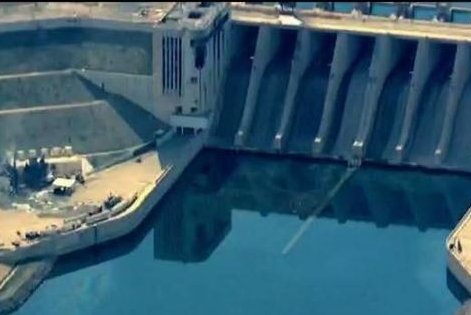The International Coalition for Operation Inherent Resolve tweeted this photo of the Tabqa Dam in Raqqa, Syria on March 27, saying they are "taking every precaution to ensure the integrity" of the dam, which has been occupied by Islamic State extremists. Photo courtesy of International Coalition for Operation Inherent Resolve/Twitter
BEIRUT, April 3 (UPI) -- As U.S.-backed Kurdish irregulars advance on the strategic city of Raqqa in northern Syria held by the Islamic State, a major fight is under way for control of the nearby Tabqa dam, one of the biggest in the country. The outcome of that battle could hasten the defeat of the jihadists and determine the future of the devastated Syrian state.
This is part of a subconflict in the Syrian war, now in its seventh year, that has become known as the war for water as competing powers in the region scramble for control of a rapidly diminishing resource.
The dam on the Euphrates River is 25 miles upstream from Raqqa, de facto capital of IS's self-proclaimed caliphate, which in 2014 spanned northern Syria and eastern Iraq. Today it is steadily crumbling in the face of major U.S.-supported military offensives in both countries.
If the Kurdish fighters can take the dam, which IS has held since 2015, they would open a new assault corridor against Raqqa, a key strategic target for IS's many enemies.
Kurdish fighters hold the northern end of the 3-mile-long dam and IS the southern. IS has threatened to unleash the dam's waters if the group is in danger of being defeated, threatening hundreds of thousands of people living downriver.
There have been conflicting reports about the dam's stability because heavy rains have filled the reservoir and increased pressure on the massive structure. Russia and IS claim U.S.-led airstrikes weakened the dam.
The United Nations warned this could lead to massive flooding across Raqqa and as far away as Deir ez-Zor, another IS stronghold further down the Euphrates. This caused panic among the 90,000 civilians still in Raqqa and hundreds reportedly began fleeing the city on March 26.
State engineers say two spillways, used to run off water behind the dam to ease the pressure, are out of action. The dam manager and his assistant were reported killed by IS shellfire on March 27 when they tried to reach the spillway mechanism to free some of the water.
The dam, built by the Soviets in the 1970s, supplies most of the electricity for northern Syria and its destruction or incapacitation would cripple the region and seriously impede the anticipated post-war reconstruction. Given the scale of destruction across Syria from six years of merciless war, rebuilding will be an immense undertaking.
There was a similar alarm in 2016 for a major dam 37 miles north of the embattled city of Mosul in northern Iraq, the first major urban center captured by IS in June 2014 and its main stronghold.
U.S.-backed Iraqi state forces have recaptured the eastern half of the city divided by the Tigris River and are slowly advancing in the face of fierce opposition in the western sector.
The Americans warned that if the 2-mile-long Mosul dam, reportedly built on unsound foundations, collapsed or was sabotaged, 11 million cubic feet of floodwater would kill up to 1.47 million people living downstream along the Tigris.
However, the dam is still in operation, although it remains a potential danger if one side or the other reaches for a doomsday disaster before they go down.
In December, water was the center of another battle when Syrian regime forces bombed the Ayn al- Fijjeh springs, 11 miles northwest of Damascus.
The spring feeds the Barada river, which supplies 70 percent of the water for the Syrian capital and its sprawling environs with a war-swollen population of about 9 million.
It was initially reported by pro-regime websites on Dec. 22 that rebels who have held Wadi Barada since mid-2012 had deliberately polluted the waters of Ayn al-Fijjeh, which forced authorities to cut off the water supply.
The regime used the alleged sabotage as a pretext for an offensive against the rebel forces holding the springs to seize control of the capital's water supply despite a nationwide cease-fire proclaimed on Dec. 30.
The water infrastructure in Wadi Barada was badly damaged by Syrian Air Force strikes.
The regime has used similar tactics in the continuing battle for resources, which has become a central aspect of the Syrian war — part and parcel of its widely criticized "surrender or starve" tactics against rebel-held cities and towns.
The water crisis caused by the attempts to blast the Wadi Barada facilities led to panic and anger and drove the price of water well beyond the means of most of the population around the capital.
Other forces in Syria's multi-sided war also use water as a weapon, particularly IS, which understands how critical water is to the caliphate they tried to establish.
At one point, IS forces shut down a major water flow from the Taqba dam to the battered city of Aleppo, which finally fell to the regime in December 2016 after a ferocious months-long bombardment.
After IS began expanding its territorial claims in western Syria in 2015, "it used water as a tool in its broader strategy of advancing and establishing control over new land," the U.S.-based global security consultancy Stratfor observed.
"True, the Islamic State has also (and perhaps more visibly) targeted strategic oil and natural gas fields in both Syria and Iraq but a close look at the group's movements clearly indicates that the Tigris and Euphrates rivers hold a central role in its planning," Stratfor said.
This article originally appeared at The Arab Weekly.















